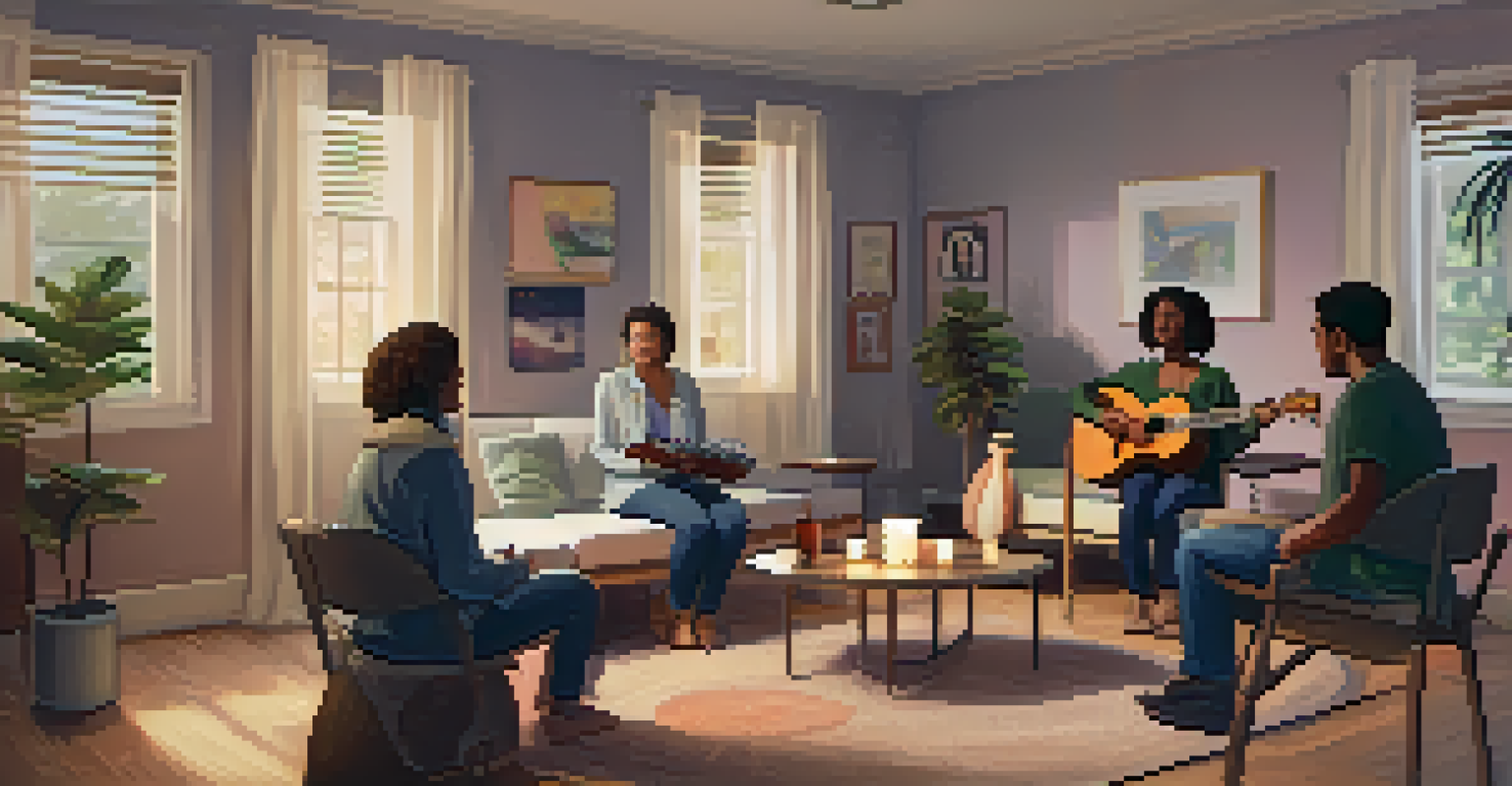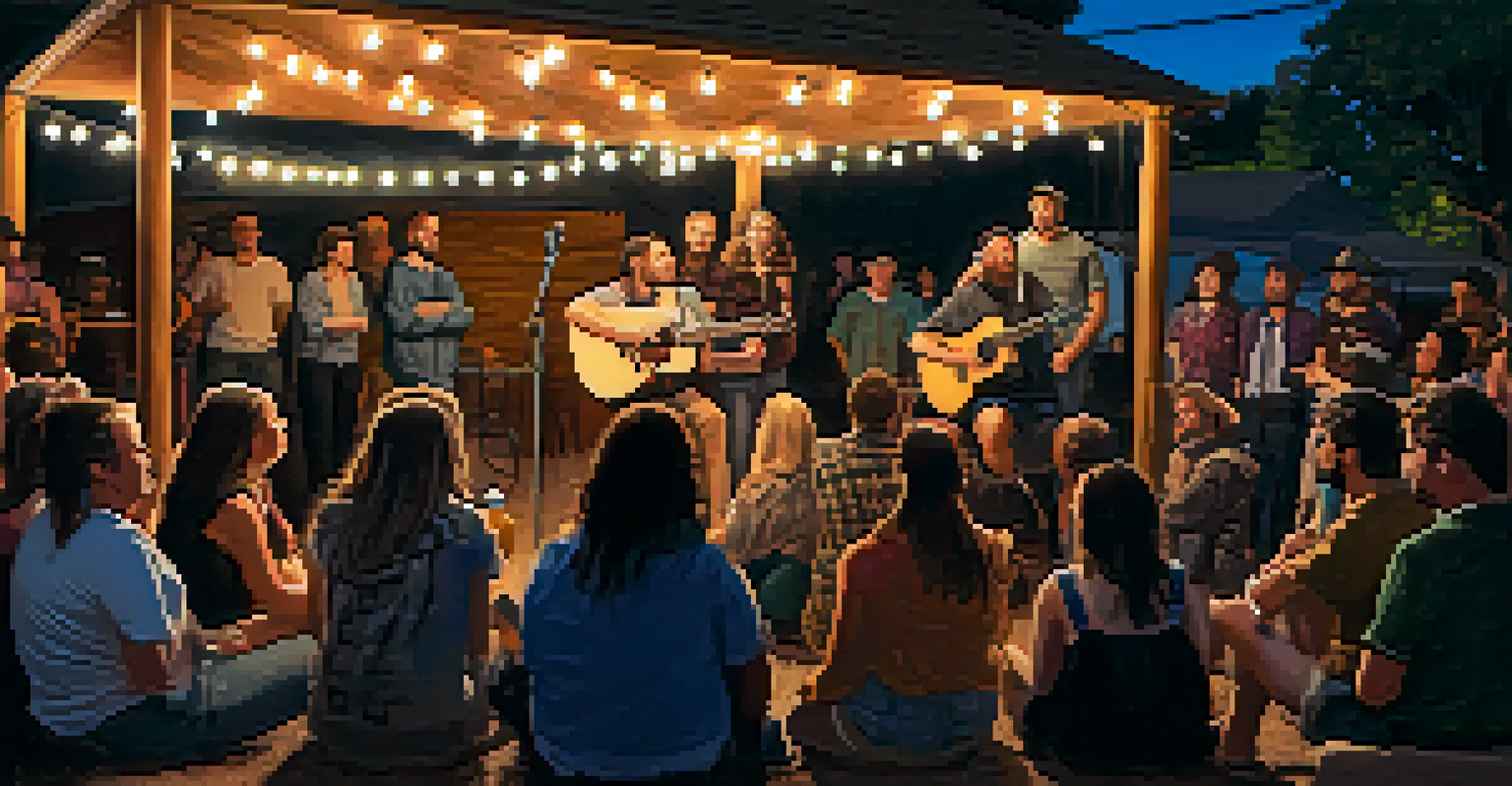The Healing Power of Music in Community Crisis Situations

Music as a Universal Language in Crisis
Music transcends cultural and linguistic barriers, making it a powerful tool during community crises. In moments of despair, people often turn to melodies that resonate with their emotions, fostering a sense of connection. Whether it’s a soothing lullaby or an upbeat anthem, music can evoke feelings of solidarity and hope.
Music can change the world because it can change people.
For instance, during the aftermath of natural disasters, communities often gather to share songs that remind them of resilience. These gatherings not only uplift spirits but also create a shared narrative that strengthens communal bonds. By participating in these musical experiences, individuals find comfort in knowing they are not alone in their struggles.
Ultimately, music serves as a reminder that even in the darkest times, there is a language of hope and healing that everyone can understand. This shared experience can help communities process trauma and begin to heal together.
The Role of Music Therapy in Healing
Music therapy has emerged as a crucial tool for mental health support, especially in crisis situations. Trained therapists use music to help individuals express emotions that may be difficult to articulate. This therapeutic approach can facilitate healing by providing a safe space for vulnerable feelings to be shared and processed.

For example, after a tragic event, music therapists may organize group sessions where participants create songs reflecting their experiences. This collaborative effort not only fosters creativity but also builds trust among participants as they share their stories. The power of creating something beautiful together can be incredibly therapeutic.
Music's Healing Power in Crises
Music serves as a universal language that fosters connection and healing during community crises.
In essence, music therapy taps into the emotional and psychological benefits of music, promoting healing in a structured and supportive environment. It underscores the idea that while crises can be isolating, the act of making music can unite and empower individuals.
Community Events: Bringing People Together Through Music
Community music events can play a pivotal role in bringing people together following a crisis. These gatherings, whether they are concerts, sing-alongs, or open mic nights, create a sense of togetherness. They encourage participation and allow individuals to reconnect with their neighbors and local culture, fostering a spirit of collective resilience.
Where words fail, music speaks.
Consider a town that has experienced a devastating flood. Organizing a local concert featuring local artists can provide an outlet for expression and healing. Attendees can share their stories, listen to music that reflects their experiences, and feel a sense of belonging, even amidst chaos.
Such events not only provide entertainment but also serve as a platform for healing and rebuilding community spirit. When people come together through music, they create an atmosphere of hope and support that can last long after the music fades.
The Psychological Benefits of Listening to Music
Listening to music has been shown to have significant psychological benefits, particularly during challenging times. Research suggests that music can reduce anxiety, improve mood, and even alleviate feelings of depression. During a crisis, these effects can be vital for maintaining mental health and well-being.
For instance, individuals might create personal playlists that help them process their emotions or distract them from distressing thoughts. This practice not only serves as a coping mechanism but also provides an opportunity for self-reflection and emotional release. The right song can feel like a warm hug during cold moments of despair.
Role of Music Therapy in Recovery
Music therapy provides a safe space for individuals to express emotions and promotes healing through collaborative creation.
In this way, music serves as a personal refuge, a way to navigate through difficult emotions and find solace. It highlights the importance of self-care and the role that music can play in nurturing our mental health during tough times.
Cultural Significance of Music in Crisis Situations
Every culture has its own unique musical traditions, and these can be particularly poignant during crises. Music often serves as a reflection of cultural identity, allowing communities to express their heritage and resilience. In times of distress, traditional songs can evoke memories of strength and unity.
For example, in many cultures, folk songs tell stories of hardship and survival. By performing these songs in times of crisis, individuals can draw strength from their cultural narratives. This not only reinforces identity but also reminds community members of their shared history and the strength that comes from it.
Thus, the cultural significance of music in crisis situations extends beyond entertainment; it's about preserving identity and fostering resilience. It’s a powerful reminder that our roots can guide us through difficult times.
Creating Safe Spaces for Musical Expression
In the aftermath of a crisis, creating safe spaces for musical expression is essential. These environments encourage individuals to share their feelings freely, without judgment. Whether through community centers, schools, or outdoor venues, providing a platform for music can facilitate healing and connection.
For instance, open jam sessions can be organized where anyone can join in, regardless of skill level. This inclusivity cultivates a sense of belonging and encourages collaboration among community members. Such spaces remind individuals that their voices matter and that they can contribute to the healing process.
Community Events Foster Resilience
Community music events create opportunities for connection and healing, helping individuals rebuild their sense of belonging after crises.
Ultimately, safe spaces for musical expression empower communities to come together, fostering a collective healing journey. In these moments, music becomes a bridge that connects hearts, minds, and spirits.
The Future of Music in Community Resilience
Looking ahead, the role of music in community resilience will only continue to grow. As we navigate an ever-changing world, music remains a steadfast companion in times of crisis. Its ability to unite, heal, and inspire is invaluable as communities face new challenges.
Innovative approaches, like virtual music gatherings and online therapy sessions, are emerging as powerful tools for connection and healing. These developments ensure that even when physical gatherings are limited, the spirit of music can still thrive, bringing people together across distances.

Ultimately, the future of music in community resilience is bright. As we embrace its healing power, we can create spaces where communities can thrive, heal, and celebrate the beauty of togetherness, regardless of the circumstances.